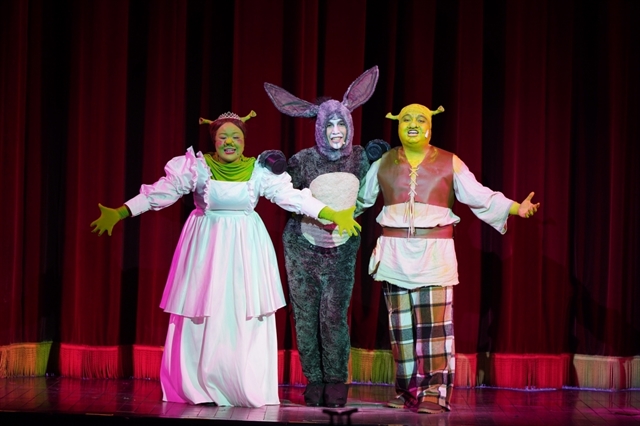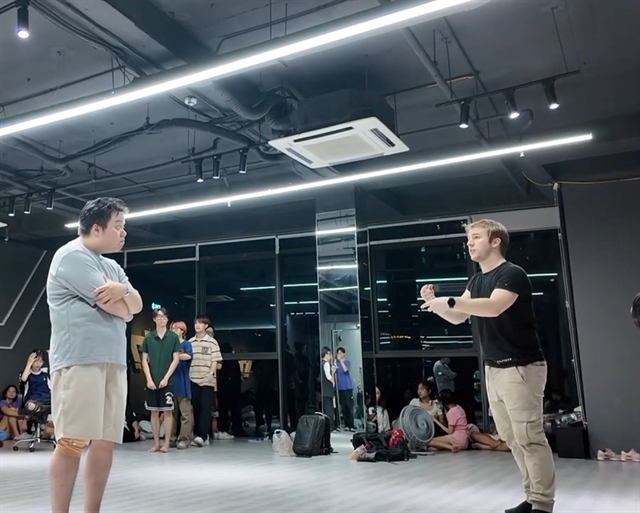Weather:
- Ha Noi 23oC
- Da Nang 21oC
- Ho Chi Minh 32oC
After the success of 'Shrek: The Musical' in Hà Nội Opera House last November, the production will be brought back this summer on a larger scale. The Broadway-style musical 'Shrek: On National Tour' will be staged in both HCM City and Hà Nội in July and August, respectively. The resident director of the musical, Jesse Donaldson-Jarrett, shares his involvement in the production with Việt Nam News.

Inner Sanctum: This is the second time the play has been performed in Việt Nam. How do you approach directing a well-known story like "Shrek" to make it fresh and engaging?
The most important part when working with well-known works is to identify what are the most important elements of the show and what you can play with. For Shrek, the important part is the balance of comedy and drama and the relationships between the characters as written in the scripts.
So, how we keep this fresh is to embrace the unique idiosyncrasies and senses of humour of our cast members. This has been an easy job for me because half of our cast are new and everyone who was involved with the show before has grown so much from what I saw in the recordings of last year. I just embraced that in the rehearsal room and created spaces for play to bring a whole life to Shrek: The Musical. Hopefully, we’ll have the audience laughing, then crying, then laughing again,

Inner Sanctum: How is a Broadway production different from a normal play?
A Broadway musical is completely different from a standard play. The biggest and most obvious difference is the super liminal presence of music and dance. This is the key acting challenge to our performers on stage for Shrek: How can I act while I am singing? What I am doing while I am dancing? This is where I come in as the director and help them find who they are singing to, what they are feeling at this moment that could bring them to dance.
There is a quote from the writers of The Little Mermaid and Beauty and the Beast that I think sums it up pretty well. “In musical theatre a character talks until they feel so much, they have to sing, and when that singing is no longer powerful enough to express that emotion. They dance.”
So what we bring to Shrek is that knowledge that everything happens for a reason, every note, and every move is important. Everything that we do comes from this idea of character. Only when we treat it as such can we live up to professional standards.
Inner Sanctum: What challenges have you faced in the production process?
An adaptation of the film Shrek, which is a meta comedy lampooning famous Disney fairy tales, as a show has a difficult balance of comedy and drama. Shrek: On National Tour is a comedy that parodies big Broadway musicals. Like any comedy, it only works when the characters take everything seriously.
Comedy works because the characters believe they are in a drama. So the biggest difficulty in performing this show is to find that balance. To take everything ‘seriously’ so that we can hit those jokes and the beautiful and touching moments these shows have.

Inner Sanctum: All the cast of the musical are young amateurs. How do you approach working with them?
Whenever I work with anyone new to the art form, especially the young people, the rehearsal room also becomes a classroom. I try to incorporate exercises into our warm-ups that help them build the skills (or sometimes the fitness) that are necessary in this art form. I am a massive believer in ‘play’. The idea that theatre is fun, and we need that childlike sense of play to explore any work to its fullest extent.
So, what I have been trying to impart to my cast is the usefulness of ‘rules’. Theatre has many rules. How to stand, how to talk, how to move, how to sing, and it’s when we embrace these ‘rules’ and play within the script (without breaking it) that is where we discover the exciting potential that is creativity. It is the creativity that comes from the wonderful young people in Việt Nam where we find what I would call “This Show”. I want them to take ownership of their ability to perform so they can continue to grow.
Inner Sanctum: How do you ensure the essence and quality of the original Broadway production?
It’s all about the basics and hitting the core principles of the show, within the believable boundaries of our abilities. We can’t expect our performers to dance like professional dancers. We have been blessed with some incredible vocal talent, but we can’t expect everyone at that level.
In a similar vein, I cannot sit there in the director's chair and expect them all to give in-depth performances from the get-go. So we focus on what we can do within the professional standard. We might not be able to have big fancy dance jumps, but we can hit clean lines, we can focus, we can learn our motivations and act accordingly onstage.
I often say to my cast: “It’s not about getting it right, it’s about giving 100 per cent of yourself to it. I will never get mad if you mess up. I will only be disappointed if I see that you aren’t trying.” It’s the little things that make a show run smoothly.

Inner Sanctum: What do you expect this experience will bring to these young Vietnamese actors in terms of personal and artistic growth?
I hope I can share some of my love for the work with them. I hope that through working with me, I can help them build their love of the art form whilst building some of their foundational skills so that they may go and work in other rehearsal rooms and have something to build their skills upon.
I have already seen immense growth from this cast in the short time I have been working with them. It’s very exciting to imagine where they will be in a few years. I would be over the moon to eventually share the stage with any members of the cast in the future.
I hope that what I can give to this group to take out into the Vietnamese art environment, is a greater sense of giving yourself up to the work. Core skills like identifying what you want in any given scene. I think if we can keep spreading these kinds of ideas and skills, there could be an evolution in Vietnamese theatre. VNS


